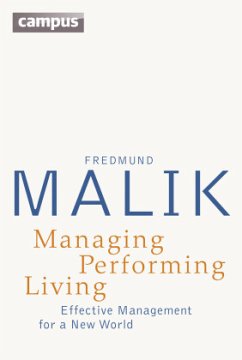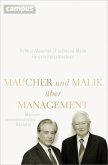Fredmund MalikEffective Management for a New World
Managing Performing Living
Effective Management for a New World
Übersetzung:Scherer, Jutta
Fredmund MalikEffective Management for a New World
Managing Performing Living
Effective Management for a New World
Übersetzung:Scherer, Jutta
- Broschiertes Buch
- Merkliste
- Auf die Merkliste
- Bewerten Bewerten
- Teilen
- Produkt teilen
- Produkterinnerung
- Produkterinnerung
Managing Performing Living is a classic in the field of management. Fredmund Malik reveals everything that all executives and experts in leading positions need to know, anytime and anywhere. He provides readers with the universal principles, tasks and tools of effective management and self-management. His book ranks among the 100 best business books of all times. The new, completely revised and updated edition is tailored to a new generation of managers, to whom effectiveness is the key to success. It shows the way to turn knowledge, personal strengths, talent, creativity and innovative…mehr
Andere Kunden interessierten sich auch für
![An der Freiheit des anderen kommt keiner vorbei An der Freiheit des anderen kommt keiner vorbei]() Reinhard K. SprengerAn der Freiheit des anderen kommt keiner vorbei30,00 €
Reinhard K. SprengerAn der Freiheit des anderen kommt keiner vorbei30,00 €![Tacheles aus der Chefetage Tacheles aus der Chefetage]() Gunar M. MichaelTacheles aus der Chefetage30,00 €
Gunar M. MichaelTacheles aus der Chefetage30,00 €![Der Chef, den ich nie vergessen werde Der Chef, den ich nie vergessen werde]() Alexander GrothDer Chef, den ich nie vergessen werde29,00 €
Alexander GrothDer Chef, den ich nie vergessen werde29,00 €![Maucher und Malik über Management Maucher und Malik über Management]() Helmut MaucherMaucher und Malik über Management27,00 €
Helmut MaucherMaucher und Malik über Management27,00 €![Radikal anders Radikal anders]() Markus WeishauptRadikal anders42,00 €
Markus WeishauptRadikal anders42,00 €![Management Management]() Fredmund MalikManagement58,00 €
Fredmund MalikManagement58,00 €![Change Management Change Management]() Klaus DopplerChange Management79,00 €
Klaus DopplerChange Management79,00 €-
-
-
Managing Performing Living is a classic in the field of management. Fredmund Malik reveals everything that all executives and experts in leading positions need to know, anytime and anywhere. He provides readers with the universal principles, tasks and tools of effective management and self-management.
His book ranks among the 100 best business books of all times. The new, completely revised and updated edition is tailored to a new generation of managers, to whom effectiveness is the key to success. It shows the way to turn knowledge, personal strengths, talent, creativity and innovative thinking into results. Managing Performing Living helps readers to cope with the "Great Transformation21", as Malik calls the ongoing centennial change in business and society. It is a book on how to create functioning organizations in a viable society.
His book ranks among the 100 best business books of all times. The new, completely revised and updated edition is tailored to a new generation of managers, to whom effectiveness is the key to success. It shows the way to turn knowledge, personal strengths, talent, creativity and innovative thinking into results. Managing Performing Living helps readers to cope with the "Great Transformation21", as Malik calls the ongoing centennial change in business and society. It is a book on how to create functioning organizations in a viable society.
Produktdetails
- Produktdetails
- Verlag: Campus Verlag
- Artikelnr. des Verlages: 50263
- 2. Aufl.
- Seitenzahl: 405
- Erscheinungstermin: 7. Juli 2015
- Englisch
- Abmessung: 228mm x 152mm x 24mm
- Gewicht: 639g
- ISBN-13: 9783593502632
- ISBN-10: 3593502631
- Artikelnr.: 41778743
- Herstellerkennzeichnung Die Herstellerinformationen sind derzeit nicht verfügbar.
- Verlag: Campus Verlag
- Artikelnr. des Verlages: 50263
- 2. Aufl.
- Seitenzahl: 405
- Erscheinungstermin: 7. Juli 2015
- Englisch
- Abmessung: 228mm x 152mm x 24mm
- Gewicht: 639g
- ISBN-13: 9783593502632
- ISBN-10: 3593502631
- Artikelnr.: 41778743
- Herstellerkennzeichnung Die Herstellerinformationen sind derzeit nicht verfügbar.
TABLE OF CONTENT
PREFACE TO THE NEW 2014 EDITION 10
Right Thinking-Right Management14
The Key to Success 14
The Great Transformation 21 18
How Effective Management Systems Are Built 24
What Right Management Can Accomplish 26
PART I
PROFESSIONALISM29
1. The Ideal Manager-a Wrong Question 31
The Universal Genius-A Stumbling Block 31
The Effective Person 33
No Accordance in Personalities 34
What Counts Is What You Do, Not What You Are Like 35
Misleading Surveys 36
2. False Theories, Errors, and Misconceptions 39
The Pursuit-of-Happiness Approach 39
Leadership and the Great Man Theory 41
Errors and Misconceptions 44
3. Management as a Profession 49
Constitutional Thinking 49
Professionalism Can Be Learnt 51
The Most Important Profession in a Modern Society 53
The Most Important Mass Profession 56
Elements of Effective Management 59
Sound Training Is Possible for Everyone 62
PART II
PRINCIPLES OF EFFECTIVE MANAGEMENT 65
Introduction 67
Simple but Not Easy 67
Useful in Difficult Situations 68
Not Inborn-Must Be Learnt 69
Ideals and Compromises 70
What Type as Role Model? 71
1. Focusing on Results 73
A Self-Evident Fact? 73
Misconceptions 75
What If People Cannot Accept This? 77
Pleasure or Result? 78
2. Contribution to the Whole 85
Position or Contribution? 86
Specialist or Generalist? 88
Wholistic Thinking 89
Contribution and Motivation 91
Contribution Instead of Title 92
The Consequence of Organization 93
3. Concentration on a Few Things 96
The Key to Results 96
Rejection Without Reason 98
Application Examples101
4. Utilizing Strengths 107
Fixation on Weaknesses 108
Matching Tasks with Strengths 109
Should Weaknesses Be Ignored? 111
No Personality Reform 113
Why Focus on Weaknesses? 114
Learning from the Greats 115
How Can We Recognize Strengths? 117
Types of Weaknesses 119
Two Sources of Peak Performance 121
5. Trust 123
Creating a Robust Management Situation 124
How Can We Build Trust? 125
6. Positive Thinking 138
Opportunities Instead of Problems 138
From Motivation to Self-Motivation 139
Positive Thinking-Inborn or Acquired? 140
Freeing Oneself of Dependencies 144
Doing One's Best 146
7. Synopsis: Quality of Management148
PART III
TASKS OF EFFECTIVE MANAGEMENT 151
Preliminary Remarks 153
1. Providing Objectives 156
No Systems Bureaucracy 157
Personal Annual Objectives 157
The General Direction 158
Basic Rules for Management by Objectives 159
2. Organizing 171
Beware of "Organizitis" 171
There Is No Such Thing as a "Good Organization" 172
The Three Basic Issues of Organizing 174
Symptoms of Bad Organization 175
3. Making Decisions 180
Wrong Opinions and Illusions 180
The Decision-Making Process 188
4. Supervising 202
Supervision Is Indispensable202
Trust as the Foundation 203
How Should We Supervise? 204
Measuring and Judging 211
5. Developing and Promoting People 215
People Instead of Employees 216
Individuals Instead of Abstractions 216
What Is Often Forgotten 224
6. Synopsis: What About all the Other Tasks? 229
PART IV
TOOLS FOR EFFECTIVE MANAGEMENT239
Instruments, Devices, Tools 241
1. Meetings 244
Reduce the Number of Meetings-Preferably to Zero 244
Crucial for Success: Preparation and Follow-Up 246
Chairing Meetings Is Hard Work 249
Types of Meetings 249
Meetings Are Not Social Events 252
Types of Items on the Agenda 253
No Item Without Action 255
Striving for Consensus 255
Are Meeting Minutes Necessary? 256
Meetings Without an Agenda257
The Key: Implementation and ContTABLE OF CONTENT
PREFACE TO THE NEW 2014 EDITION 10
Right Thinking-Right Management14
The Key to Success 14
The Great Transformation 21 18
How Effective Management Systems Are Built 24
What Right Management Can Accomplish 26
PART I
PROFESSIONALISM29
1. The Ideal Manager-a Wrong Question 31
The Universal Genius-A Stumbling Block 31
The Effective Person 33
No Accordance in Personalities 34
What Counts Is What You Do, Not What You Are Like 35
Misleading Surveys 36
2. False Theories, Errors, and Misconceptions 39
The Pursuit-of-Happiness Approach 39
Leadership and the Great Man Theory 41
Errors and Misconceptions 44
3. Management as a Profession 49
Constitutional Thinking 49
Professionalism Can Be Learnt 51
The Most Important Profession in a Modern Society 53
The Most Important Mass Profession 56
Elements of Effective Management 59
Sound Training Is Possible for Everyone 62
PART II
PRINCIPLES OF EFFECTIVE MANAGEMENT 65
Introduction 67
Simple but Not Easy 67
Useful in Difficult Situations 68
Not Inborn-Must Be Learnt 69
Ideals and Compromises 70
What Type as Role Model? 71
1. Focusing on Results 73
A Self-Evident Fact? 73
Misconceptions 75
What If People Cannot Accept This? 77
Pleasure or Result? 78
2. Contribution to the Whole 85
Position or Contribution? 86
Specialist or Generalist? 88
Wholistic Thinking 89
Contribution and Motivation 91
Contribution Instead of Title 92
The Consequence of Organization 93
3. Concentration on a Few Things 96
The Key to Results 96
Rejection Without Reason 98
Application Examples101
4. Utilizing Strengths 107
Fixation on Weaknesses 108
Matching Tasks with Strengths 109
Should Weaknesses Be Ignored? 111
No Personality Reform 113
Why Focus on Weaknesses? 114
Learning from the Greats 115
How Can We Recognize Strengths? 117
Types of Weaknesses 119
Two Sources of Peak Performance 121
5. Trust 123
Creating a Robust Management Situation 124
How Can We Build Trust? 125
6. Positive Thinking 138
Opportunities Instead of Problems 138
From Motivation to Self-Motivation 139
Positive Thinking-Inborn or Acquired? 140
Freeing Oneself of Dependencies 144
Doing One's Best 146
7. Synopsis: Quality of Management148
PART III
TASKS OF EFFECTIVE MANAGEMENT 151
Preliminary Remarks 153
1. Providing Objectives 156
No Systems Bureaucracy 157
Personal Annual Objectives 157
The General Direction 158
Basic Rules for Management by Objectives 159
2. Organizing 171
Beware of "Organizitis" 171
There Is No Such Thing as a "Good Organization" 172
The Three Basic Issues of Organizing 174
Symptoms of Bad Organization 175
3. Making Decisions 180
Wrong Opinions and Illusions 180
The Decision-Making Process 188
4. Supervising 202
Supervision Is Indispensable202
Trust as the Foundation 203
How Should We Supervise? 204
Measuring and Judging 211
5. Developing and Promoting People 215
People Instead of Employees 216
Individuals Instead of Abstractions 216
What Is Often Forgotten 224
6. Synopsis: What About all the Other Tasks? 229
PART IV
TOOLS FOR EFFECTIVE MANAGEMENT239
Instruments, Devices, Tools 241
1. Meetings 244
Reduce the Number of Meetings-Preferably to Zero 244
Crucial for Success: Preparation and Follow-Up 246
Chairing Meetings Is Hard Work 249
Types of Meetings 249
Meetings Are Not Social Events 252
Types of Items on the Agenda 253
No Item Without Action 255
Striving for Consensus 255
Are Meeting Minutes Necessary? 256
Meetings Without an Agenda257
The Key: Implementation and Continuous Follow-Up 259
2. Reports 260
The Small Step to Effectiveness 261
Clear Language, Logic, and Precision 262
Bad Habits and Impositions 264
3. Job Design and Assignment Control 267
Six Mistakes in Job Design 268
PREFACE TO THE NEW 2014 EDITION 10
Right Thinking-Right Management14
The Key to Success 14
The Great Transformation 21 18
How Effective Management Systems Are Built 24
What Right Management Can Accomplish 26
PART I
PROFESSIONALISM29
1. The Ideal Manager-a Wrong Question 31
The Universal Genius-A Stumbling Block 31
The Effective Person 33
No Accordance in Personalities 34
What Counts Is What You Do, Not What You Are Like 35
Misleading Surveys 36
2. False Theories, Errors, and Misconceptions 39
The Pursuit-of-Happiness Approach 39
Leadership and the Great Man Theory 41
Errors and Misconceptions 44
3. Management as a Profession 49
Constitutional Thinking 49
Professionalism Can Be Learnt 51
The Most Important Profession in a Modern Society 53
The Most Important Mass Profession 56
Elements of Effective Management 59
Sound Training Is Possible for Everyone 62
PART II
PRINCIPLES OF EFFECTIVE MANAGEMENT 65
Introduction 67
Simple but Not Easy 67
Useful in Difficult Situations 68
Not Inborn-Must Be Learnt 69
Ideals and Compromises 70
What Type as Role Model? 71
1. Focusing on Results 73
A Self-Evident Fact? 73
Misconceptions 75
What If People Cannot Accept This? 77
Pleasure or Result? 78
2. Contribution to the Whole 85
Position or Contribution? 86
Specialist or Generalist? 88
Wholistic Thinking 89
Contribution and Motivation 91
Contribution Instead of Title 92
The Consequence of Organization 93
3. Concentration on a Few Things 96
The Key to Results 96
Rejection Without Reason 98
Application Examples101
4. Utilizing Strengths 107
Fixation on Weaknesses 108
Matching Tasks with Strengths 109
Should Weaknesses Be Ignored? 111
No Personality Reform 113
Why Focus on Weaknesses? 114
Learning from the Greats 115
How Can We Recognize Strengths? 117
Types of Weaknesses 119
Two Sources of Peak Performance 121
5. Trust 123
Creating a Robust Management Situation 124
How Can We Build Trust? 125
6. Positive Thinking 138
Opportunities Instead of Problems 138
From Motivation to Self-Motivation 139
Positive Thinking-Inborn or Acquired? 140
Freeing Oneself of Dependencies 144
Doing One's Best 146
7. Synopsis: Quality of Management148
PART III
TASKS OF EFFECTIVE MANAGEMENT 151
Preliminary Remarks 153
1. Providing Objectives 156
No Systems Bureaucracy 157
Personal Annual Objectives 157
The General Direction 158
Basic Rules for Management by Objectives 159
2. Organizing 171
Beware of "Organizitis" 171
There Is No Such Thing as a "Good Organization" 172
The Three Basic Issues of Organizing 174
Symptoms of Bad Organization 175
3. Making Decisions 180
Wrong Opinions and Illusions 180
The Decision-Making Process 188
4. Supervising 202
Supervision Is Indispensable202
Trust as the Foundation 203
How Should We Supervise? 204
Measuring and Judging 211
5. Developing and Promoting People 215
People Instead of Employees 216
Individuals Instead of Abstractions 216
What Is Often Forgotten 224
6. Synopsis: What About all the Other Tasks? 229
PART IV
TOOLS FOR EFFECTIVE MANAGEMENT239
Instruments, Devices, Tools 241
1. Meetings 244
Reduce the Number of Meetings-Preferably to Zero 244
Crucial for Success: Preparation and Follow-Up 246
Chairing Meetings Is Hard Work 249
Types of Meetings 249
Meetings Are Not Social Events 252
Types of Items on the Agenda 253
No Item Without Action 255
Striving for Consensus 255
Are Meeting Minutes Necessary? 256
Meetings Without an Agenda257
The Key: Implementation and ContTABLE OF CONTENT
PREFACE TO THE NEW 2014 EDITION 10
Right Thinking-Right Management14
The Key to Success 14
The Great Transformation 21 18
How Effective Management Systems Are Built 24
What Right Management Can Accomplish 26
PART I
PROFESSIONALISM29
1. The Ideal Manager-a Wrong Question 31
The Universal Genius-A Stumbling Block 31
The Effective Person 33
No Accordance in Personalities 34
What Counts Is What You Do, Not What You Are Like 35
Misleading Surveys 36
2. False Theories, Errors, and Misconceptions 39
The Pursuit-of-Happiness Approach 39
Leadership and the Great Man Theory 41
Errors and Misconceptions 44
3. Management as a Profession 49
Constitutional Thinking 49
Professionalism Can Be Learnt 51
The Most Important Profession in a Modern Society 53
The Most Important Mass Profession 56
Elements of Effective Management 59
Sound Training Is Possible for Everyone 62
PART II
PRINCIPLES OF EFFECTIVE MANAGEMENT 65
Introduction 67
Simple but Not Easy 67
Useful in Difficult Situations 68
Not Inborn-Must Be Learnt 69
Ideals and Compromises 70
What Type as Role Model? 71
1. Focusing on Results 73
A Self-Evident Fact? 73
Misconceptions 75
What If People Cannot Accept This? 77
Pleasure or Result? 78
2. Contribution to the Whole 85
Position or Contribution? 86
Specialist or Generalist? 88
Wholistic Thinking 89
Contribution and Motivation 91
Contribution Instead of Title 92
The Consequence of Organization 93
3. Concentration on a Few Things 96
The Key to Results 96
Rejection Without Reason 98
Application Examples101
4. Utilizing Strengths 107
Fixation on Weaknesses 108
Matching Tasks with Strengths 109
Should Weaknesses Be Ignored? 111
No Personality Reform 113
Why Focus on Weaknesses? 114
Learning from the Greats 115
How Can We Recognize Strengths? 117
Types of Weaknesses 119
Two Sources of Peak Performance 121
5. Trust 123
Creating a Robust Management Situation 124
How Can We Build Trust? 125
6. Positive Thinking 138
Opportunities Instead of Problems 138
From Motivation to Self-Motivation 139
Positive Thinking-Inborn or Acquired? 140
Freeing Oneself of Dependencies 144
Doing One's Best 146
7. Synopsis: Quality of Management148
PART III
TASKS OF EFFECTIVE MANAGEMENT 151
Preliminary Remarks 153
1. Providing Objectives 156
No Systems Bureaucracy 157
Personal Annual Objectives 157
The General Direction 158
Basic Rules for Management by Objectives 159
2. Organizing 171
Beware of "Organizitis" 171
There Is No Such Thing as a "Good Organization" 172
The Three Basic Issues of Organizing 174
Symptoms of Bad Organization 175
3. Making Decisions 180
Wrong Opinions and Illusions 180
The Decision-Making Process 188
4. Supervising 202
Supervision Is Indispensable202
Trust as the Foundation 203
How Should We Supervise? 204
Measuring and Judging 211
5. Developing and Promoting People 215
People Instead of Employees 216
Individuals Instead of Abstractions 216
What Is Often Forgotten 224
6. Synopsis: What About all the Other Tasks? 229
PART IV
TOOLS FOR EFFECTIVE MANAGEMENT239
Instruments, Devices, Tools 241
1. Meetings 244
Reduce the Number of Meetings-Preferably to Zero 244
Crucial for Success: Preparation and Follow-Up 246
Chairing Meetings Is Hard Work 249
Types of Meetings 249
Meetings Are Not Social Events 252
Types of Items on the Agenda 253
No Item Without Action 255
Striving for Consensus 255
Are Meeting Minutes Necessary? 256
Meetings Without an Agenda257
The Key: Implementation and Continuous Follow-Up 259
2. Reports 260
The Small Step to Effectiveness 261
Clear Language, Logic, and Precision 262
Bad Habits and Impositions 264
3. Job Design and Assignment Control 267
Six Mistakes in Job Design 268
TABLE OF CONTENT
PREFACE TO THE NEW 2014 EDITION 10
Right Thinking-Right Management14
The Key to Success 14
The Great Transformation 21 18
How Effective Management Systems Are Built 24
What Right Management Can Accomplish 26
PART I
PROFESSIONALISM29
1. The Ideal Manager-a Wrong Question 31
The Universal Genius-A Stumbling Block 31
The Effective Person 33
No Accordance in Personalities 34
What Counts Is What You Do, Not What You Are Like 35
Misleading Surveys 36
2. False Theories, Errors, and Misconceptions 39
The Pursuit-of-Happiness Approach 39
Leadership and the Great Man Theory 41
Errors and Misconceptions 44
3. Management as a Profession 49
Constitutional Thinking 49
Professionalism Can Be Learnt 51
The Most Important Profession in a Modern Society 53
The Most Important Mass Profession 56
Elements of Effective Management 59
Sound Training Is Possible for Everyone 62
PART II
PRINCIPLES OF EFFECTIVE MANAGEMENT 65
Introduction 67
Simple but Not Easy 67
Useful in Difficult Situations 68
Not Inborn-Must Be Learnt 69
Ideals and Compromises 70
What Type as Role Model? 71
1. Focusing on Results 73
A Self-Evident Fact? 73
Misconceptions 75
What If People Cannot Accept This? 77
Pleasure or Result? 78
2. Contribution to the Whole 85
Position or Contribution? 86
Specialist or Generalist? 88
Wholistic Thinking 89
Contribution and Motivation 91
Contribution Instead of Title 92
The Consequence of Organization 93
3. Concentration on a Few Things 96
The Key to Results 96
Rejection Without Reason 98
Application Examples101
4. Utilizing Strengths 107
Fixation on Weaknesses 108
Matching Tasks with Strengths 109
Should Weaknesses Be Ignored? 111
No Personality Reform 113
Why Focus on Weaknesses? 114
Learning from the Greats 115
How Can We Recognize Strengths? 117
Types of Weaknesses 119
Two Sources of Peak Performance 121
5. Trust 123
Creating a Robust Management Situation 124
How Can We Build Trust? 125
6. Positive Thinking 138
Opportunities Instead of Problems 138
From Motivation to Self-Motivation 139
Positive Thinking-Inborn or Acquired? 140
Freeing Oneself of Dependencies 144
Doing One's Best 146
7. Synopsis: Quality of Management148
PART III
TASKS OF EFFECTIVE MANAGEMENT 151
Preliminary Remarks 153
1. Providing Objectives 156
No Systems Bureaucracy 157
Personal Annual Objectives 157
The General Direction 158
Basic Rules for Management by Objectives 159
2. Organizing 171
Beware of "Organizitis" 171
There Is No Such Thing as a "Good Organization" 172
The Three Basic Issues of Organizing 174
Symptoms of Bad Organization 175
3. Making Decisions 180
Wrong Opinions and Illusions 180
The Decision-Making Process 188
4. Supervising 202
Supervision Is Indispensable202
Trust as the Foundation 203
How Should We Supervise? 204
Measuring and Judging 211
5. Developing and Promoting People 215
People Instead of Employees 216
Individuals Instead of Abstractions 216
What Is Often Forgotten 224
6. Synopsis: What About all the Other Tasks? 229
PART IV
TOOLS FOR EFFECTIVE MANAGEMENT239
Instruments, Devices, Tools 241
1. Meetings 244
Reduce the Number of Meetings-Preferably to Zero 244
Crucial for Success: Preparation and Follow-Up 246
Chairing Meetings Is Hard Work 249
Types of Meetings 249
Meetings Are Not Social Events 252
Types of Items on the Agenda 253
No Item Without Action 255
Striving for Consensus 255
Are Meeting Minutes Necessary? 256
Meetings Without an Agenda257
The Key: Implementation and ContTABLE OF CONTENT
PREFACE TO THE NEW 2014 EDITION 10
Right Thinking-Right Management14
The Key to Success 14
The Great Transformation 21 18
How Effective Management Systems Are Built 24
What Right Management Can Accomplish 26
PART I
PROFESSIONALISM29
1. The Ideal Manager-a Wrong Question 31
The Universal Genius-A Stumbling Block 31
The Effective Person 33
No Accordance in Personalities 34
What Counts Is What You Do, Not What You Are Like 35
Misleading Surveys 36
2. False Theories, Errors, and Misconceptions 39
The Pursuit-of-Happiness Approach 39
Leadership and the Great Man Theory 41
Errors and Misconceptions 44
3. Management as a Profession 49
Constitutional Thinking 49
Professionalism Can Be Learnt 51
The Most Important Profession in a Modern Society 53
The Most Important Mass Profession 56
Elements of Effective Management 59
Sound Training Is Possible for Everyone 62
PART II
PRINCIPLES OF EFFECTIVE MANAGEMENT 65
Introduction 67
Simple but Not Easy 67
Useful in Difficult Situations 68
Not Inborn-Must Be Learnt 69
Ideals and Compromises 70
What Type as Role Model? 71
1. Focusing on Results 73
A Self-Evident Fact? 73
Misconceptions 75
What If People Cannot Accept This? 77
Pleasure or Result? 78
2. Contribution to the Whole 85
Position or Contribution? 86
Specialist or Generalist? 88
Wholistic Thinking 89
Contribution and Motivation 91
Contribution Instead of Title 92
The Consequence of Organization 93
3. Concentration on a Few Things 96
The Key to Results 96
Rejection Without Reason 98
Application Examples101
4. Utilizing Strengths 107
Fixation on Weaknesses 108
Matching Tasks with Strengths 109
Should Weaknesses Be Ignored? 111
No Personality Reform 113
Why Focus on Weaknesses? 114
Learning from the Greats 115
How Can We Recognize Strengths? 117
Types of Weaknesses 119
Two Sources of Peak Performance 121
5. Trust 123
Creating a Robust Management Situation 124
How Can We Build Trust? 125
6. Positive Thinking 138
Opportunities Instead of Problems 138
From Motivation to Self-Motivation 139
Positive Thinking-Inborn or Acquired? 140
Freeing Oneself of Dependencies 144
Doing One's Best 146
7. Synopsis: Quality of Management148
PART III
TASKS OF EFFECTIVE MANAGEMENT 151
Preliminary Remarks 153
1. Providing Objectives 156
No Systems Bureaucracy 157
Personal Annual Objectives 157
The General Direction 158
Basic Rules for Management by Objectives 159
2. Organizing 171
Beware of "Organizitis" 171
There Is No Such Thing as a "Good Organization" 172
The Three Basic Issues of Organizing 174
Symptoms of Bad Organization 175
3. Making Decisions 180
Wrong Opinions and Illusions 180
The Decision-Making Process 188
4. Supervising 202
Supervision Is Indispensable202
Trust as the Foundation 203
How Should We Supervise? 204
Measuring and Judging 211
5. Developing and Promoting People 215
People Instead of Employees 216
Individuals Instead of Abstractions 216
What Is Often Forgotten 224
6. Synopsis: What About all the Other Tasks? 229
PART IV
TOOLS FOR EFFECTIVE MANAGEMENT239
Instruments, Devices, Tools 241
1. Meetings 244
Reduce the Number of Meetings-Preferably to Zero 244
Crucial for Success: Preparation and Follow-Up 246
Chairing Meetings Is Hard Work 249
Types of Meetings 249
Meetings Are Not Social Events 252
Types of Items on the Agenda 253
No Item Without Action 255
Striving for Consensus 255
Are Meeting Minutes Necessary? 256
Meetings Without an Agenda257
The Key: Implementation and Continuous Follow-Up 259
2. Reports 260
The Small Step to Effectiveness 261
Clear Language, Logic, and Precision 262
Bad Habits and Impositions 264
3. Job Design and Assignment Control 267
Six Mistakes in Job Design 268
PREFACE TO THE NEW 2014 EDITION 10
Right Thinking-Right Management14
The Key to Success 14
The Great Transformation 21 18
How Effective Management Systems Are Built 24
What Right Management Can Accomplish 26
PART I
PROFESSIONALISM29
1. The Ideal Manager-a Wrong Question 31
The Universal Genius-A Stumbling Block 31
The Effective Person 33
No Accordance in Personalities 34
What Counts Is What You Do, Not What You Are Like 35
Misleading Surveys 36
2. False Theories, Errors, and Misconceptions 39
The Pursuit-of-Happiness Approach 39
Leadership and the Great Man Theory 41
Errors and Misconceptions 44
3. Management as a Profession 49
Constitutional Thinking 49
Professionalism Can Be Learnt 51
The Most Important Profession in a Modern Society 53
The Most Important Mass Profession 56
Elements of Effective Management 59
Sound Training Is Possible for Everyone 62
PART II
PRINCIPLES OF EFFECTIVE MANAGEMENT 65
Introduction 67
Simple but Not Easy 67
Useful in Difficult Situations 68
Not Inborn-Must Be Learnt 69
Ideals and Compromises 70
What Type as Role Model? 71
1. Focusing on Results 73
A Self-Evident Fact? 73
Misconceptions 75
What If People Cannot Accept This? 77
Pleasure or Result? 78
2. Contribution to the Whole 85
Position or Contribution? 86
Specialist or Generalist? 88
Wholistic Thinking 89
Contribution and Motivation 91
Contribution Instead of Title 92
The Consequence of Organization 93
3. Concentration on a Few Things 96
The Key to Results 96
Rejection Without Reason 98
Application Examples101
4. Utilizing Strengths 107
Fixation on Weaknesses 108
Matching Tasks with Strengths 109
Should Weaknesses Be Ignored? 111
No Personality Reform 113
Why Focus on Weaknesses? 114
Learning from the Greats 115
How Can We Recognize Strengths? 117
Types of Weaknesses 119
Two Sources of Peak Performance 121
5. Trust 123
Creating a Robust Management Situation 124
How Can We Build Trust? 125
6. Positive Thinking 138
Opportunities Instead of Problems 138
From Motivation to Self-Motivation 139
Positive Thinking-Inborn or Acquired? 140
Freeing Oneself of Dependencies 144
Doing One's Best 146
7. Synopsis: Quality of Management148
PART III
TASKS OF EFFECTIVE MANAGEMENT 151
Preliminary Remarks 153
1. Providing Objectives 156
No Systems Bureaucracy 157
Personal Annual Objectives 157
The General Direction 158
Basic Rules for Management by Objectives 159
2. Organizing 171
Beware of "Organizitis" 171
There Is No Such Thing as a "Good Organization" 172
The Three Basic Issues of Organizing 174
Symptoms of Bad Organization 175
3. Making Decisions 180
Wrong Opinions and Illusions 180
The Decision-Making Process 188
4. Supervising 202
Supervision Is Indispensable202
Trust as the Foundation 203
How Should We Supervise? 204
Measuring and Judging 211
5. Developing and Promoting People 215
People Instead of Employees 216
Individuals Instead of Abstractions 216
What Is Often Forgotten 224
6. Synopsis: What About all the Other Tasks? 229
PART IV
TOOLS FOR EFFECTIVE MANAGEMENT239
Instruments, Devices, Tools 241
1. Meetings 244
Reduce the Number of Meetings-Preferably to Zero 244
Crucial for Success: Preparation and Follow-Up 246
Chairing Meetings Is Hard Work 249
Types of Meetings 249
Meetings Are Not Social Events 252
Types of Items on the Agenda 253
No Item Without Action 255
Striving for Consensus 255
Are Meeting Minutes Necessary? 256
Meetings Without an Agenda257
The Key: Implementation and ContTABLE OF CONTENT
PREFACE TO THE NEW 2014 EDITION 10
Right Thinking-Right Management14
The Key to Success 14
The Great Transformation 21 18
How Effective Management Systems Are Built 24
What Right Management Can Accomplish 26
PART I
PROFESSIONALISM29
1. The Ideal Manager-a Wrong Question 31
The Universal Genius-A Stumbling Block 31
The Effective Person 33
No Accordance in Personalities 34
What Counts Is What You Do, Not What You Are Like 35
Misleading Surveys 36
2. False Theories, Errors, and Misconceptions 39
The Pursuit-of-Happiness Approach 39
Leadership and the Great Man Theory 41
Errors and Misconceptions 44
3. Management as a Profession 49
Constitutional Thinking 49
Professionalism Can Be Learnt 51
The Most Important Profession in a Modern Society 53
The Most Important Mass Profession 56
Elements of Effective Management 59
Sound Training Is Possible for Everyone 62
PART II
PRINCIPLES OF EFFECTIVE MANAGEMENT 65
Introduction 67
Simple but Not Easy 67
Useful in Difficult Situations 68
Not Inborn-Must Be Learnt 69
Ideals and Compromises 70
What Type as Role Model? 71
1. Focusing on Results 73
A Self-Evident Fact? 73
Misconceptions 75
What If People Cannot Accept This? 77
Pleasure or Result? 78
2. Contribution to the Whole 85
Position or Contribution? 86
Specialist or Generalist? 88
Wholistic Thinking 89
Contribution and Motivation 91
Contribution Instead of Title 92
The Consequence of Organization 93
3. Concentration on a Few Things 96
The Key to Results 96
Rejection Without Reason 98
Application Examples101
4. Utilizing Strengths 107
Fixation on Weaknesses 108
Matching Tasks with Strengths 109
Should Weaknesses Be Ignored? 111
No Personality Reform 113
Why Focus on Weaknesses? 114
Learning from the Greats 115
How Can We Recognize Strengths? 117
Types of Weaknesses 119
Two Sources of Peak Performance 121
5. Trust 123
Creating a Robust Management Situation 124
How Can We Build Trust? 125
6. Positive Thinking 138
Opportunities Instead of Problems 138
From Motivation to Self-Motivation 139
Positive Thinking-Inborn or Acquired? 140
Freeing Oneself of Dependencies 144
Doing One's Best 146
7. Synopsis: Quality of Management148
PART III
TASKS OF EFFECTIVE MANAGEMENT 151
Preliminary Remarks 153
1. Providing Objectives 156
No Systems Bureaucracy 157
Personal Annual Objectives 157
The General Direction 158
Basic Rules for Management by Objectives 159
2. Organizing 171
Beware of "Organizitis" 171
There Is No Such Thing as a "Good Organization" 172
The Three Basic Issues of Organizing 174
Symptoms of Bad Organization 175
3. Making Decisions 180
Wrong Opinions and Illusions 180
The Decision-Making Process 188
4. Supervising 202
Supervision Is Indispensable202
Trust as the Foundation 203
How Should We Supervise? 204
Measuring and Judging 211
5. Developing and Promoting People 215
People Instead of Employees 216
Individuals Instead of Abstractions 216
What Is Often Forgotten 224
6. Synopsis: What About all the Other Tasks? 229
PART IV
TOOLS FOR EFFECTIVE MANAGEMENT239
Instruments, Devices, Tools 241
1. Meetings 244
Reduce the Number of Meetings-Preferably to Zero 244
Crucial for Success: Preparation and Follow-Up 246
Chairing Meetings Is Hard Work 249
Types of Meetings 249
Meetings Are Not Social Events 252
Types of Items on the Agenda 253
No Item Without Action 255
Striving for Consensus 255
Are Meeting Minutes Necessary? 256
Meetings Without an Agenda257
The Key: Implementation and Continuous Follow-Up 259
2. Reports 260
The Small Step to Effectiveness 261
Clear Language, Logic, and Precision 262
Bad Habits and Impositions 264
3. Job Design and Assignment Control 267
Six Mistakes in Job Design 268








